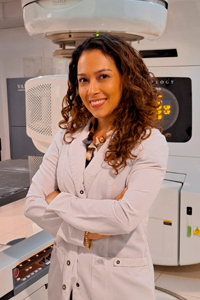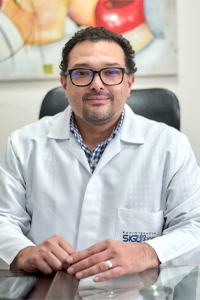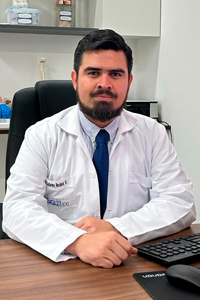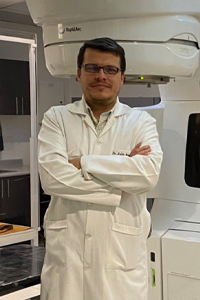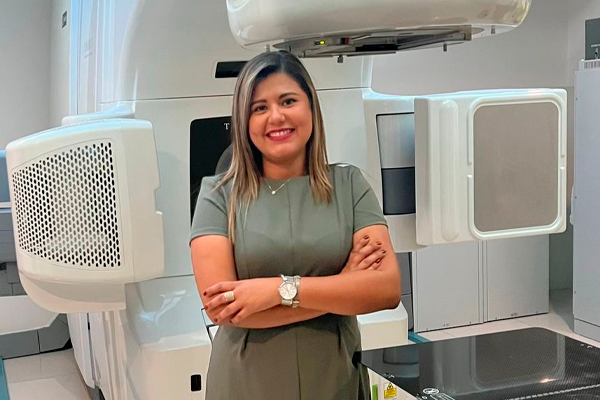Dr. Juliana Ramírez
Radiation Oncologist
Dr. Ramirez has a lot of experience in body and intracranial radiosurgery treatments. Expert in novel approaches for prostate, brain and CNS injuries. Comprehensive management of radiation oncology.
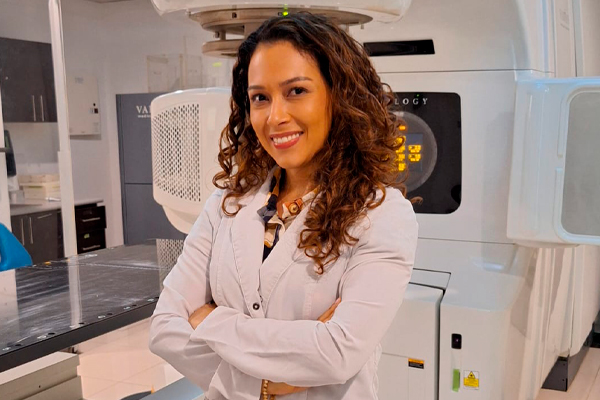
Dr. Ramirez has a lot of experience in body and intracranial radiosurgery treatments. Expert in novel approaches for prostate, brain and CNS injuries. Comprehensive management of radiation oncology.

Extensive experience in CNS Radiosurgery. Dr Blanco has extensive experience in intracranial treatments with novel approaches, unique in the country. Pioneer in schemes for the treatment of functional disorders, multiple metastases, AV malformations and other malignant and non-malignant pathologies.
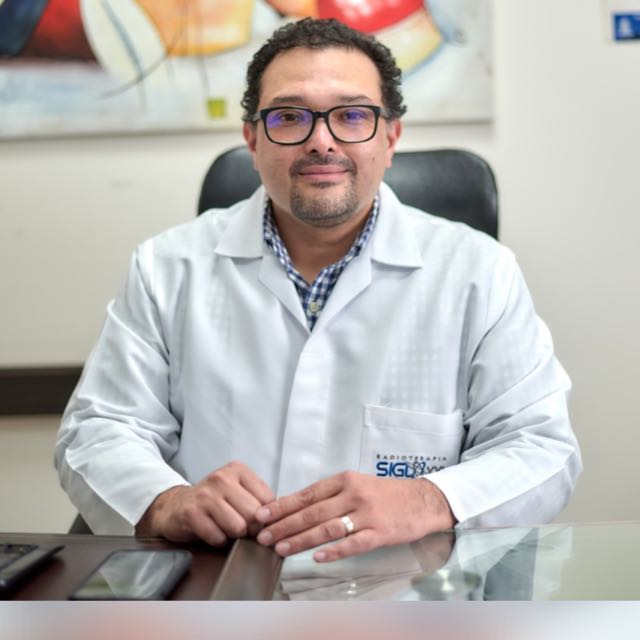
University of Buenos Aires, Argentina. | Since 2005
National Center for Oncological Research, Center for Biosanitary Studies and European School of Oncology | Since 2015
Tibás Comprehensive Clinic, Lic. Rodrigo Fournier G.
| 2001-2002
San Juan de Dios Hospital
| 2005 - 2009
San Vicente Paul Hospital.
| 2005-2012
Mexico Hospital
| 2009
Extensive experience and knowledge in comprehensive cranial and body radiotherapy and radiosurgery treatments. Dr Guillermo Recinos has successfully treated brain injuries such as meningiomas in single sessions and has trained extensively in the treatment of prostate cancer.
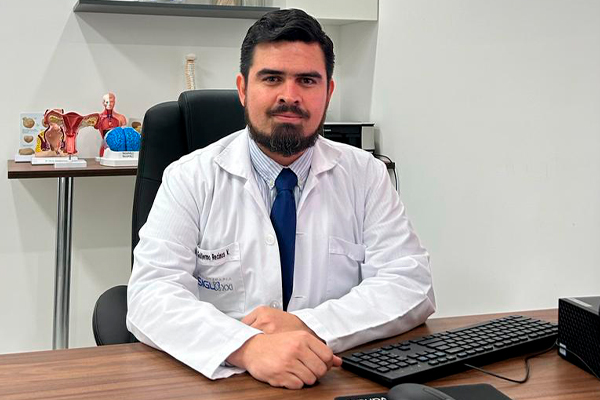
Extensive experience in radiosurgery and radiotherapy treatments. Expert in treatments for lung injuries (treatment for multiple clinical studies of this disease). Extensive knowledge in radiation treatments successfully treating non-malignant lesions, multiple lesions and various types of tumors.
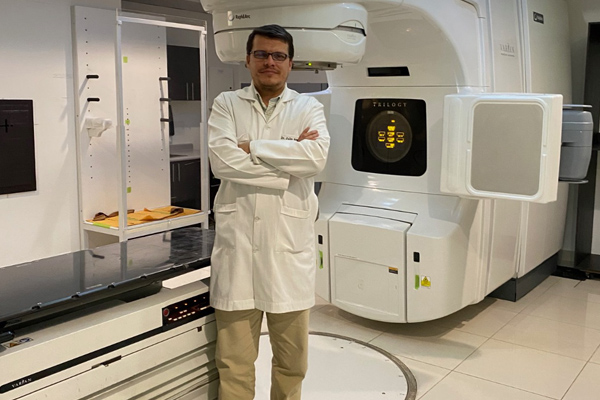
University of Costa Rica/Caja Costarricense del Seguro Social and Catalan Institute of Oncology. Barcelona, Spain. Agreement International Atomic Energy Agency (IAEA) | 2007-2011
Catalan Institute of Oncology | 2010
University of Murcia-Madrid Institute of Oncology/Gregorio Marañón General University Hospital. Madrid Spain. 2010-2011
Spanish Society of Radiation Oncology and Spanish Society of Clinical Oncology/Francisco de Vitoria University. Madrid Spain. | 2015-2017
Complutense University of Madrid | 2017-2018
Alfonso X El Sabio University, Madrid, Spain| 2021-2022
Francisco de Vitoria University. Spanish Society of Radiation Oncology-SEOR | 2023-2024
Spanish Society of Medical Radiology-SERAM. UROIMA | 2024
Assistant Physician Specialist in Radiotherapy. Department of Hemato-Oncology | 2011 - Current
21st Century Radiotherapy Medical Center | 2011 - Current
University of Costa Rica/CENDEISSS- CCSS | 2012 - Current
Costa Rican Cancer Center/Chavarria Imaging Center. | 2019 - Current
National University of Costa Rica| 2018 - 2022
Hospital Clínica Biblica| 2023 - Current
Mexico Hospital
Astra Zeneca | 2015 - Current
Extensive knowledge and experience in Radiation Oncology. He has training and experience in cranial and body radiosurgery treatments with novel approaches in multiple and localized lesions.
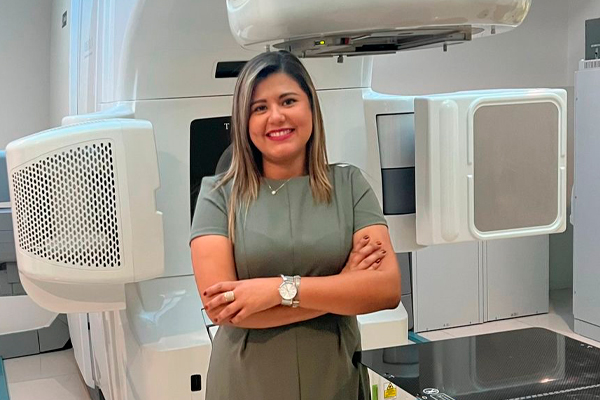
University of Costa Rica | Since 2012
University of Costa Rica | Since 2012
University of Costa Rica | Since 2017
Complutense University of Madrid | Since 2020
National Autonomous University of Mexico | From 2023
EBAIS COOPESANA | 2013
Medical Emergencies Service San Juan de Dios Hospital | 2013 to 2015
Medical Emergencies Service Hospital Mexico | 2015 to 2017
Mexico Hospital | 2017 - 2018
San Juan de Dios Hospital | 2018 - Current
performing guards at the San Rafael de Alajuela Hospital| 2018 - Current
Robotic Radiosurgery Center
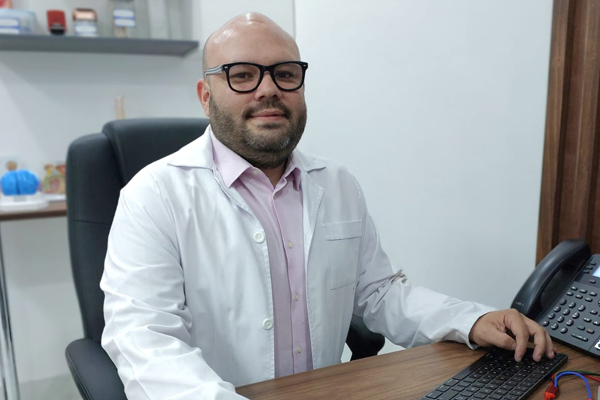
UCIMED University of Medical Sciences | Since 2011
University of Costa Rica UCR | Since 2018
Tech México, Technological University | From 2022
Oncology Hospital of the Siglo XXI National Medical Center
Mexico City | 2018
National Cancer Institute Chile
Santiago | 2019
National Institute of Neoplastic Diseases
Lima – Peru | 2019
Disney's Grand Floridian Resort
Florida - USA | 2020
Mexico Hospital. Costa Rican Social Security Fund Costa Rica (CCSS)
San Jose - Costa Rica| 2018 - Current
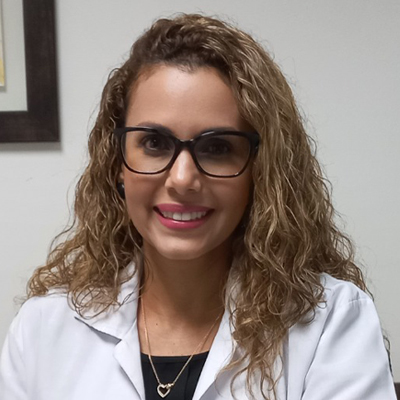
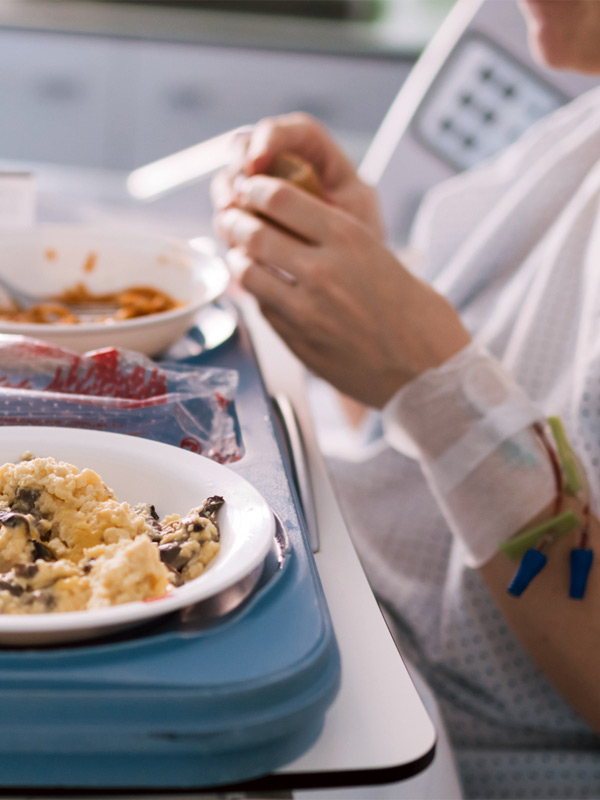
Diet is an important part of cancer treatment. By maintaining proper nutrition before, during and after your treatment you will feel better and have more strength to perform daily tasks. People with cancer often need to follow a different diet than what is considered healthy. For most people, a healthy diet consists of eating:
However, when you have cancer, you need to eat to maintain your energy in order to overcome the side effects of the treatment. When health is good, it is usually not a problem to eat enough food. But, when faced with cancer and treatment, this can be a real challenge.
When we talk about the medical term “intra-fraction elongated intervals,” we are referring to the time separation between radiation doses within a treatment. Administration of fractionated doses allows normal cells time to repair damage caused by radiation, while cancer cells, which often have a more limited repair capacity, can accumulate damage and eventually die (Shibamoto, Miyakawa, Otsuka , & Iwata, 2016).
People experience different emotions and physical reactions before, during and after cancer treatment. Good nutrition is very important for patients diagnosed with any type of cancer because it helps them feel better, cope better with the recommended medical treatment, and fight the disease. There are times when a person cannot consume an adequate diet, which can cause weight loss and general weakness.
When cancer is diagnosed, the doctor may recommend one of these treatments, such as: surgery, radiation therapy, chemotherapy, hormonal and biological therapy (immunotherapy), or some combination of these. All of these methods have side effects that can affect a person's getting adequate nutrition including:
Whether you experience these side effects will depend on many factors, including the type of cancer, the part of the body that was treated, and the type, duration, and dose of treatment. Some eating problems are caused by the treatment itself, but sometimes they are a result of the person feeling upset, worried or scared. While you are undergoing treatment for cancer, you should consult with a Nutritionist to make specific recommendations about adequate nutrition.
To obtain better nutrition, some general dietary recommendations can be followed, depending on the side effect:
Loss of Appetite: It is recommended to consume small and frequent meals. You should have snacks high in calories and protein within reach, to consume them when you feel hungry. Example: Turrialba Cheese or Peanut Butter with non-dairy Crackers, Low-fat Yogurt or Nuts.
Weightloss: It is recommended to follow the recommendations when there is loss of appetite.
Weight gain: It is important to notify the doctor because it can often be fluid retention (edema). Whether it is fluid retention or body weight gain, you should consult with the Nutritionist.
Mouth or Throat Irritation: You should consult your doctor to make sure it is not a dental problem. Eat soft foods that are easy to chew and swallow. Example: Some types of Smoothies, Bananas, Pureed or Canned Fruits, Nectars, Low-fat Yogurt, Mashed Potatoes, Macaroni in natural tomato sauce, Jellies, Flans with lactose-free and skim milk, Scrambled Eggs, Hot Cereals, Pureed Vegetables , Meat Purees etc.
Dryness in Mouth: It is recommended to take a sip of water every 5 or 10 minutes so you can swallow better. You should consume sweet or acidic drinks, such as lemonade, suck on candy, lollipops or chewing gum to produce more saliva. Sauces and dressings can be added to foods and consumed pureed to make them easier to swallow.
Changes in Taste and Smell: You may experience a bitter or metallic taste in foods, especially meats or other high-protein foods. Additionally, many foods may feel less flavorful. You should choose the most attractive foods to see and smell. If you do not want to consume beef or pork because of the flavor you feel, you can consume white meats such as poultry, fresh fish with little odor, eggs or dairy products. Foods can be marinated in sweet fruit juices, Italian dressing, or sweet and sour sauce. If you are experiencing discomfort from odors, it is recommended to serve food at room temperature.
Nausea and Vomiting: You should ask your doctor about medications called antiemetics that can help control nausea and vomiting. It is recommended to avoid foods high in fat, spicy, acidic, very sweet and with a strong smell. Less liquids should be taken with meals. Take small sips of liquids throughout the day.
Diarrhea: You should consult your doctor to identify the cause of diarrhea in order to treat it successfully. It is recommended to drink large amounts of fluids to replace lost water. Instead of eating three large meals, you should eat small meals throughout the day and avoid foods high in fat and irritants.
Constipation: It is recommended to drink at least 8 8-ounce glasses a day and consume foods high in fiber, such as: Whole Grain Breads and Cereals, Dried and Fresh Fruits with Skin, Fresh Vegetables, Potatoes with Skin, Beans, Beans and Chickpeas. It is important to consult your doctor beforehand since, depending on the treatment, some foods are excluded from the diet.
When cancer is diagnosed, it is very important to undergo appropriate treatment following the recommendations of the Doctor and Nutritionist.
*This information does not constitute or replace a diet. Always consult your Doctor or Nutritionist *

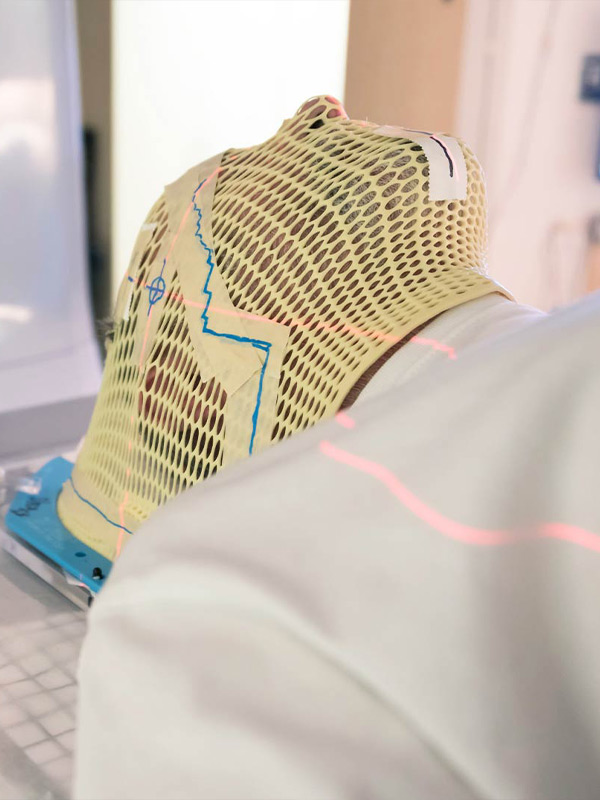
Radiosurgery or SRS For its acronym in English, it is a concept devised by Neurosurgeon and Professor Lars Leksell in 1952, however, the first treatment could not be performed until the 60's, when the idea of using radiation to produce a change in a tissue, this idea was quickly transferred to tumors located in the central nervous system (CNS).
In our time, the use of this “energy” instrument has revolutionized the management of non-malignant tumors, Like the Meningiomas, Schwannomas, Pituitary adenomas, where it has demonstrated tumor control rates superior to 90% at 10 or more years of follow-up.
Another field of much research, functional disorders, like pain, the most frequent representative of them is Trigeminal Neuralgia, where in patients refractory to drugs or do not qualify or desire microvascular decompression surgery (when we talk about classic Neuralgia) Radiosurgery could provide relief to users. There is a lot of research currently on the different “targets” that could be useful for relief, we hope that we will soon have more studies on this.
Finally, in the area of neuro-vascular, Radiosurgery is considered the best therapy for arteriovenous malformations or cavernous angiomas, non-surgical due to eloquent or deep location.
Today, advances in engineering, computing and artificial intelligence contribute enormously to this technique continuing to gain more and more space in modern life in Neuro-Oncology, Neurovascular and functional disorders in the CNS.
At the Siglo XXI Radiotherapy Medical Center we have cutting-edge technology for the application of cranial and body radiosurgery. The implementation of artificial intelligence tools such as our Elements planning software in conjunction with our Brainlab ExacTrac equipment – real-time monitoring – allows us to provide the best possible treatment scheme.
This, added to the human resource with the most experience in the country in radiosurgery issues: highly trained personnel, in constant training and in constant review of protocols for the application of the best treatments.
